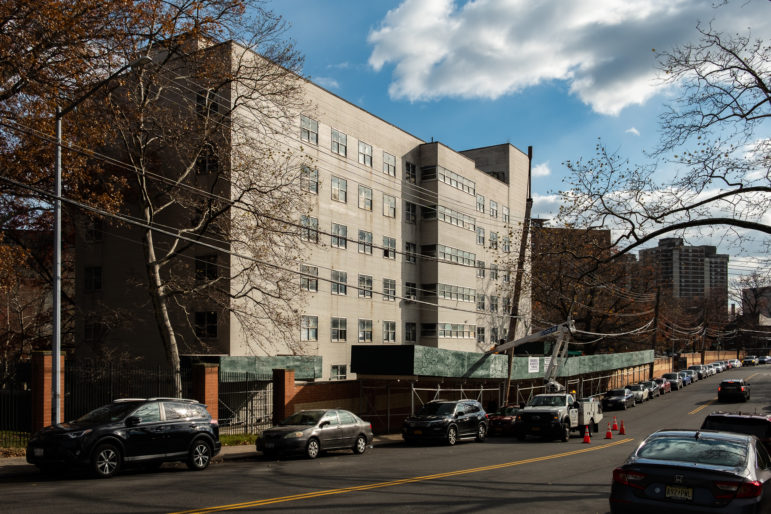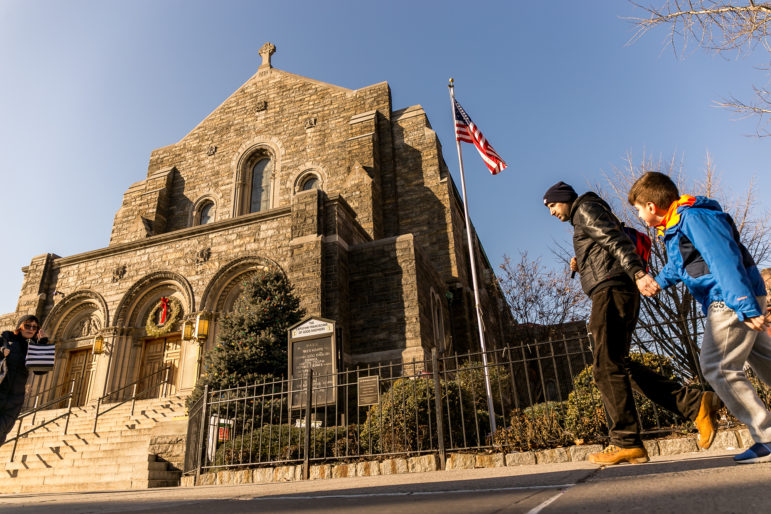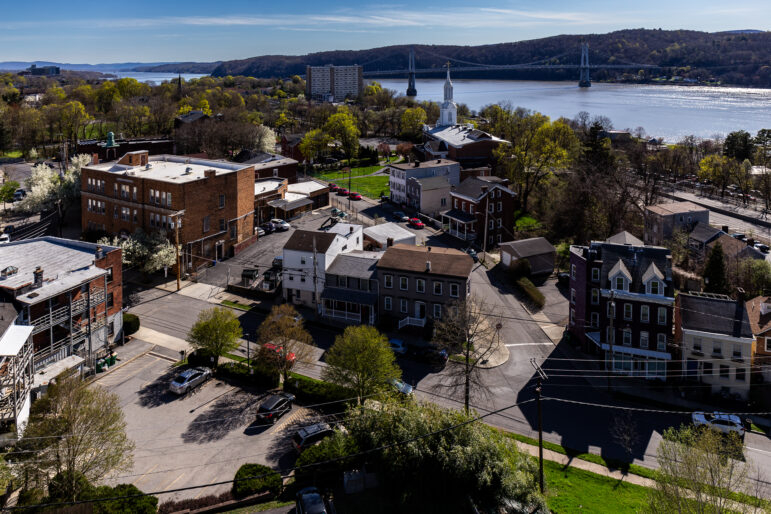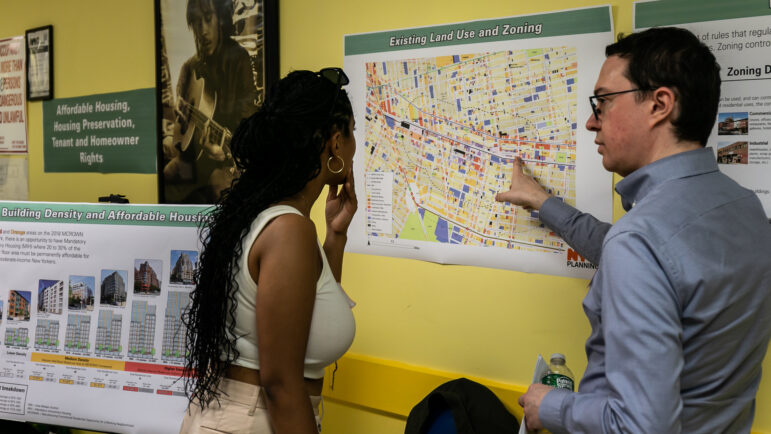“Study after study has shown that stable housing is the linchpin for successful reentry and for creating strong social bonds. These outcomes, in turn, lead to a substantially reduced likelihood of facing a new criminal charge, which—contrary to the scare tactics of this bill’s opponents—will make our city at large safer, too. “

Adi Talwar
View from Seminole Avenue of the proposed building for Just Home, which would house formerly incarcerated New Yorkers on Jacobi Medical Center’s campus in The Bronx.This holiday season, New Yorkers are experiencing homelessness at rates never seen before. On the night of Nov. 30, 64,075 individuals slept in the Department of Homeless Services (DHS) shelter system—a number that has risen sharply in the past several months as several factors have coincided, including rising rents, mounting evictions, and the arrivals of thousands of new New Yorkers seeking asylum.
Homelessness has always affected different populations differently. Recent data reported by the Coalition for the Homeless showed that while Black and Latino individuals make up 53 percent of the city’s overall population, they constitute nearly 90 percent of the population in DHS shelters. And people exiting incarceration are significantly more likely to become homeless than the rest of the population: of those who left state prison in 2021 and came to New York City, about 40 percent ended up in a shelter or a similar placement, constituting more than 2,000 of our neighbors and friends.
As more people have entered the shelter system this year, the number of people exiting shelter into permanent housing has remained distressingly low. On average, households in the shelter system spend nearly 500 days there. Why is it so difficult for homeless New Yorkers to access permanent housing?
For homeless New Yorkers (and others) with conviction histories, a major barrier is housing discrimination. As a New Yorker who is active in supporting folks experiencing homelessness in my neighborhood, I see the challenges that my neighbors with conviction records face in trying to find housing. Hilton Webb, Jr., a formerly incarcerated New Yorker and member of the Fair Chance for Housing campaign, has said, “Since my incarceration I’m living an authentic life, and as such I have disclosed to landlords, private homeowners, and supers, that I have been formerly incarcerated,” after which “[s]uperintendents have told me, ‘I can’t even show you the apartment.’”
As Webb goes on to argue, “[t]his essentially becomes a forever punishment and should be unheard of in a city which claims to be progressive.” Indeed, this persistent discrimination is out of step with the professed value of a city that embraces racial, social, and economic justice, and it contributes our ever-worsening homelessness crisis.
Now, however, the City Council is considering legislation that would end this still-legal form of discrimination. Sponsored by Council Majority Leader Keith Powers—with support from 29 other Council Members, as well as borough- and city-wide elected officials—the Fair Chance for Housing Act would prohibit private housing providers from discriminating on the basis of an individual’s history of justice involvement. Under the bill, with well-tailored exceptions, landlords would no longer be able to use notoriously inaccurate and unreliable background checks to deny housing to people with conviction records.
The protections afforded by the Fair Chance for Housing Act would help justice-involved New Yorkers exit or avoid homelessness and regain stability in their lives. Housing allows people to take care of their health, maintain relationships with family members, and have a stable base from which to seek employment. It makes it easier for people to participate in and contribute to their communities and support their families. Study after study has shown that stable housing is the linchpin for successful reentry and for creating strong social bonds. These outcomes, in turn, lead to a substantially reduced likelihood of facing a new criminal charge, which—contrary to the scare tactics of this bill’s opponents—will make our city at large safer, too.
Having a conviction record is not uncommon in New York City. Nearly 750,000 New Yorkers—close to 11 percent of the city’s adult population—have conviction records. These New Yorkers are family members, friends, and neighbors. Nationwide, more than 30 million American children, including many in New York City, have parents with conviction records. Indeed, discrimination against justice-involved individuals puts them at heightened risk of homelessness, too.
In addition to being good policy, banning discrimination against justice-involved New Yorkers also enjoys broad-based support within our city. More than 10,000 New Yorkers listed it as a way to help formerly incarcerated New Yorkers succeed in the recent NYC Speaks survey. The Council’s Progressive Caucus, which boasts 35 members, has named Fair Chance for Housing a top legislative priority for this Council session. And the Fair Chance for Housing Campaign, with more than 100 organizational supporters, has loudly and devotedly championed this commonsense legislative action.
To be sure, there is more work to do to fight housing discrimination and ensure that all New Yorkers have access to permanent housing. For one, the New York City Commission on Human Rights needs adequate staffing in order to ensure vigorous enforcement, education, and outreach efforts. And building on this year’s record funding for CityFHEPS vouchers for New Yorkers trying to exit homelessness is a necessary complement to this legislation in order to ensure that New Yorkers who are both justice-involved and homeless have the means to be able to afford a new apartment. All the same, the Fair Chance for Housing Act would be a powerful sword and shield against housing discrimination.
With most major crimes up in New York City relative to 2019, it may, at first blush, seem to some like the wrong time for this legislation. Yet we can, in fact, make our communities durably and demonstrably safer by helping people with a history of justice involvement enjoy the stability of a home and ensure that their conviction—which carries an end date—does not become a life sentence. To affirm the dignity of all New Yorkers, the City Council should pass the Fair Chance for Housing Act without delay.
Pablo Zevallos is a tenants’ rights attorney and an Open Hearts Initiative member.









One thought on “Opinion: Housing for Our Formerly Incarcerated Neighbors Serves Us All”
People in the area where Just Home is proposed should ask to have a tour of the Fortune Society’s Castle and Castle Gardens in upper Manhattan and speak to its residents and neighbors. Fortune knows how to assist formerly incarcerated people get readjusted to regular life and provides all the services that they’ll need. Just Home can be a benefit to the neighborhood just as Castle Gardens is a benefit. https://fortunesociety.org/
https://www.csh.org/wp-content/uploads/2013/03/Fortune-Society-Castle-Gardens1.pdf